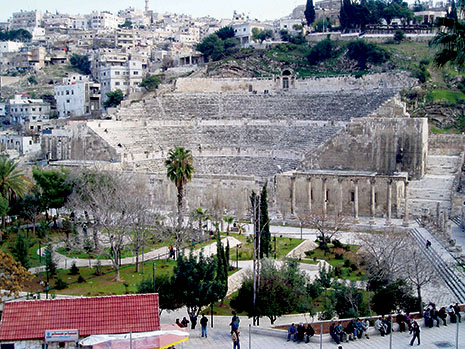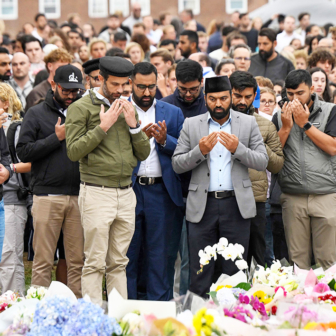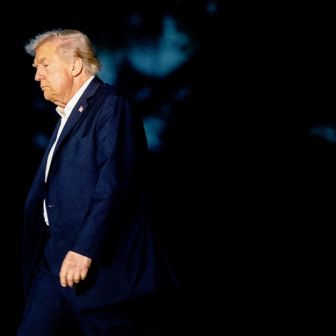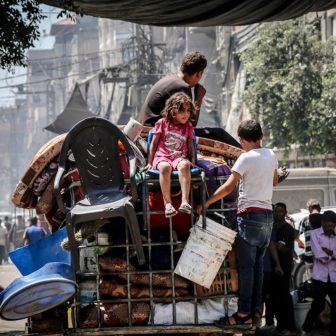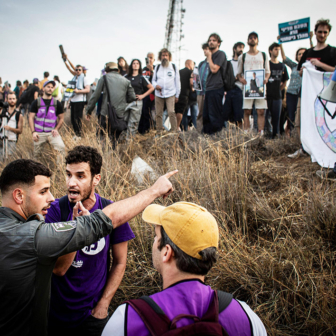SUNRISE is perhaps the most beautiful time of day, much like sunset but with a sense of energy and optimism. On the few occasions over the past decade and a half that I’ve stayed up all night, my mind has returned to the night in Amman a decade and a half ago, when I stayed up, without intending to, until dawn and beyond. A string of encounters made it a far more interesting evening and early morning than I had anticipated, cementing my interest in the Middle East and giving me fresh insight into that fascinating, complex and at times infuriating part of the world.
The night’s experiences were already half over when I snuck up to the roof of my hotel in the downtown area of the city well after midnight, carrying a book that I didn’t end up reading, and found a small foldout chair to sit on. It was the middle of summer, and the temperature was almost perfect; opposite was the Roman amphitheatre with a major street running in front of it, and I could see across to the hill opposite, where an old citadel and the royal palace stood within the maze of buildings on the hillside. In the dark, of course, the details of the scene were obscured, but the streetlights and house lights illuminated just enough to create a magical vista.
Many people prefer the old buildings of Islamic Cairo, or the Mediterranean charm of Beirut and Alexandria, or the historical weight of Jerusalem, and Amman certainly can’t compete with those places in terms of history and complexity. From the air it looks similar to other Arab cities: dun-coloured, slightly chaotic and densely populated. On the ground, close up, it has a distinct atmosphere and mood.
In front of me and to my left, between the hotel and the opposite hill, ran Al-Hashemi Street, one of the main roads through the downtown area. During the day it had been abuzz with activity and bursting with traffic; blocks of cars surged past, with few breaks for the hapless pedestrian trying to get across the street. Now, it was almost silent, with only the sound of an occasional truck or taxi or a very occasional car or bike.
Before I knew it the first of the day’s prayers, at first light, were echoing out across the city. As the skyline quickly turned pink, then orange, the city came to life. The shops started to open, people began appearing in larger numbers on the footpaths, the traffic grew denser, and the noises of the city rose from the dawn murmur to a rumbling, honking, pulsating commotion. My visit to this remarkable city was almost over.
THE EVENING had begun when I decided to head out for dinner. I’d been in Jordan for a few months doing interviews and collecting material for my doctorate, and this was my last night in Amman. After that, I had only a few days in Bahrain ahead of me before heading back home. The plan was to have a pleasant dinner and then get some sleep before the flight. I had seen everything there was to see of the place – or so I thought.
Deciding to splurge on dinner, I went out early to a small Lebanese restaurant in Shmeisani. Back then this was probably the most upmarket of Amman’s suburbs, and to this day it’s not a bad place for a meal or some shopping. Lebanese food would have to be my favourite: it’s more than enough just sitting down to mezza, the little hors d’oeuvre–type dishes that to many people are Lebanese food. At a good restaurant, of course, there can be fifteen or twenty such dishes, including olives, dips, sausages, stuffed vegetables or vine leaves, and sardines. In a good restaurant in Lebanon itself, the breadth of mezza becomes an art form.
What we think of as Lebanese or Middle Eastern food in Australia can be quite different. For many of us the signature dish is felafel – deep-fried balls of spiced chickpea or broad bean paste – but in the Middle East felafel is a street food. Here, a restaurant serving felafel would be like an Australian restaurant serving up a battered sav or a meat pie (although I suppose some celebrity chef has done exactly that, with appropriate irony). Like everything else, even the humble felafel is politically contested in the Middle East: it is claimed by Egyptians (who call it ta’amiyya), Palestinians, Israelis and, of course, Lebanese, among others. The word itself – meaning “peppers” but also possibly a corruption of the adjective for “crunchy” – gives little away about its origins.
The region has seen so much intermingling of foods that these days little is authentically the product of one country. Much has been claimed from interactions with the rest of the world: chillies and potatoes – and so many other of today’s staples – from the New World, along with the now almost globally ubiquitous tomato; eggplants probably from India; many herbs and especially spices from South Asia and Southeast Asia; and tea, of course, from China. The Arabs claim to have invented the drying process for pasta, when they occupied Sicily, but they probably got the idea from the Chinese and their noodles.
The waiter in the restaurant that night was a member of the largest group in Jordan, the Palestinians. Although Jordan is ruled by a monarchy originally from the Arabian peninsula and backed by the local bedouin (tribespeople), the waves of migration after the 1948–49 Arab–Israeli War and the 1967 Six Day War mean that, by some estimates, 70 per cent or more of the population is Palestinian. Apart from creating some delicate politics within the kingdom, this means that many of the ordinary people one meets in Jordan – most of the taxi drivers, service station attendants, waiters, for example – are Palestinian.
This young waiter was charming and amusing, but when I eventually asked him about his heritage and his politics, the fire within him erupted. The rage he felt about his own family’s loss, and that of his people, was palpable. He was ardent in his belief that the Oslo peace process – which was still alive at the time, but just starting its long unravelling after Binyamin Netanyahu’s election win in May that year – was a distraction staged by Israel, with American blessing, to formalise Israel’s final borders on terms that would destroy the Palestinians and any chance they had for a viable state of their own.
He may have been right. At any rate, his claims were among the most common heard in the region. Besides, who if born Palestinian would not be a conspiracy theorist? Most Palestinians have a cheerless story to tell, and saddest of all are the oldest ones, who cling to memories from before 1948 and sometimes still keep a title deed or a photo as if it will let them reclaim for their families the land they lost. That land is now part of a rebuilt village, or a parking lot, or a warehouse, and however unjust it might be, they will probably never get it back.
My waiter was no fan of Jordan, either. He felt unable to afford a stable existence, which would mean he could get married, and said that “the Jordanians” – the local tribespeople, presumably – discriminate against the Palestinian majority living among them. It’s true that there is a glass ceiling of sorts for Palestinians in some government institutions and certain career paths, but the Jordanians have given the Palestinians citizenship – other Arab states do not – and have not just allowed, but often blessed, marriages and other links across Jordanian–Palestinian lines. They have been pretty good hosts, in fact.
The other interesting group represented at the restaurant were the expatriates. About half a million Iraqis had fled to Jordan from Saddam’s Iraq during the 1990–91 Gulf War, but at that time there were not a huge number of Westerners living in the kingdom. There are many more now, to the point where renting an apartment in Abdoun, one of the wealthiest areas of Amman and among the most popular among Europeans, Americans and others can cost more than a comparable place in Sydney or Melbourne. Gone are the 1970s when Jordan was a cheap place to live in or visit; even in 1996 it was more costly than Egypt, Syria or other favourite haunts of long-term backpackers.
I ended up talking to a group of Brits who were at the next table: a couple who had stopped and settled for a few years in Jordan after more than a decade travelling the world teaching English, and a couple of expatriate businesspeople of some sort. Almost immediately they were complaining about their respective lots in life: about the vagaries of the local culture, the inconveniences of adjusting to local norms, the isolation, the cost of living – yes, seriously – and the things that they missed being away from home.
I was gobsmacked – how many people could I think of who would love to have a life as flavoursome and stimulating as theirs – and yet it’s amazing how often such grumbling is heard. Jordan, moreover, is one of the easier places to live as a foreigner: its people are friendly, English is quite widely spoken as a second language, and most Western luxuries can be found there. Of course, expatriates who spend too long away from home can become isolated, no matter where they are, and I will never forget the melancholy – it was probably grief, actually – of the wife of a businessman I knew who, after more than thirty years moving around the world, said she had become so itinerant that she no longer had a place to be buried. That is a real sorrow born of losing one’s connections to place: to any place. Much more common are the expatriates who, having chosen the life they now have, squander all that is dynamic, insightful and educational about it, often for the very reason they chose to live abroad to begin with – because it’s not like home.
FOR WHATEVER reason, even after a very long and filling dinner I knew I would not be able to sleep, and so I went on to a nearby bar. I am not simply falling prey to the allure of a part of the world I fell in love with when I say that Jordan is friendly. It is also, in fact, a remarkably safe place, and in that respect not unusual in the region. I have walked through many cities of the Middle East at night; Damascus at two in the morning, Cairo many times in the late evening, even places like Beirut and Tehran, and there is generally a strong feeling of safety, at least from street violence or theft. Terrorism, war and generalised violence are a feature of very particular places at certain times – right now, I would not visit the Gaza Strip, or wander around Yemen, or travel in the Arab parts of Iraq, without being very, very nervous – but most of the region, most of the time, is very safe.
In decor and atmosphere, the bar was clearly targeting Western customers, but as is often the case with pubs in the region, as many locals as foreigners were gathered there. Some, I assume, were alcoholics – a couple of the patrons looked completely lost in themselves – probably drinking for the same reasons as alcoholics the world over. Others might have lived in the West at some point, or simply aspired to do so, and for them sampling beers in a smoky pub was exotic, a link to another culture. I struck up a conversation with one of the patrons – again a Palestinian – and found that he had a mix of reasons for being there. He was bored and not terribly happy with his daily routine, but as an engineer he was hardly among the destitute of the city. He was there, he claimed, partly to seek out foreigners, to meet people who were a little more exotic and interesting than those he normally saw at work or at home.
The bar seemed to act as a place for local prostitutes to meet people as well. Prostitution in the Middle East gets little attention in the West, even from academics studying the region, yet it is common enough. I once had a student ask me if prostitution even existed in the Middle East, to which the only answer I could muster was, “Only to the extent that sex exists there.” Certainly the industry in the Middle East is much more discreet than in Australia – there are no newspaper ads for escorts, and no women standing on sidewalks in seedier parts of large cities (or if they do, they are stopped very quickly and emphatically) – but it is probably not much smaller as an industry as a result. In poorer countries it thrives off tourism: in Egypt, Morocco and Tunisia, as examples, there are streams of European tourists who support it. Important, too, are visitors from the Gulf, who in the summer months will stay for weeks or even two or three months. In many cases, a couple of young men on one of these longer summer vacations will rent an apartment short-term, complete with a couple of “maids” to assist in various household duties. Most countries in the region have massage parlours, many but not all of which are legitimate therapy centres.
Common in bars like this one are women from the former Soviet Union who are technically employed as waitresses or cleaners or singers but who moonlight as prostitutes (with the bar manager’s blessing, of course, since he’s getting an often unfairly large cut of the takings). This type of bar is common in global cities like Dubai, and around the Mediterranean, and so this one in Amman that night was not unusual. Prostitution is a reminder of many things, I suppose: of a pathology in (male) human nature, of course, but also of how difficult and unfair life is for many women, especially those in poorer parts of the world. Some would have been aware of what they were coming to Amman to do, but most, I suspect, had little choice. Overrepresented in their ranks are Muslim women who have been disowned by their families for a sexual transgression of some kind: the concept of ’ird, or sexual honour, means that in all but the most Westernised or forgiving homes, such women are seen as having disgraced the family’s honour. Common too are widows and refugees, again with little choice and little power to change their circumstances.
AFTER leaving the bar, I went for a long walk, at one point passing a butcher’s area behind a shop. A man was killing and cleaning chickens; other details, including how these poor birds were being treated in their final moments, are best not shared in any detail. I could not help but glare at him, so needlessly aggressive and desensitised had he seemingly become in his job. Once he noticed me, he yelled something; such was my Arabic that I could only discern a couple of words, but to help me out he followed up with a couple of choice expletives in English.
I would see many unkind, and some very nasty, acts against animals in the region over the years. What is most striking about the abuse of animals is the enormous gap between theory and practice: Islam was over a millennium ahead of its time in giving animals and their welfare real consideration. Respect for the lives of animals is built into its laws and customs, which include a prohibition against harming them needlessly or for human enjoyment or sport, and a requirement that animals being slaughtered for food in a halal (“lawful”) way must be killed quickly and with as little stress or pain as possible. There are many stories of the Prophet Mohammed being kind to animals and enjoining others to do likewise.
Current practice, however, can be very different. While our record in the West is not good in this regard – to some extent with pets, but especially with industrialised caged-chicken farming and egg production, and the treatment of pigs in feedlots – it seems to me worse in the Middle East. Some of the investigations carried out by Animals Australia and others highlight the maltreatment of animals in the region, including Australian sheep exported live for slaughter during festivals. There also seems a lack of education about such things, and even a lack of concern: if you raise this issue with people in the region, the most common reply is a question along the lines of, “Why do you worry about this, given the state of human rights and human welfare?” The region has enough political problems and human rights abuses that – while I still think animal welfare is important, and have since that night in particular – such a response is understandable.
THE NIGHT in Amman ended strangely, too, with a taxi ride to the airport a couple of hours after dawn. I still felt energised by the night, and yet sorry to be leaving, and I talked to the taxi driver about this. Normally I avoid conversations with taxi drivers, or at least I have to be in the mood. If travel has tarnished or hardened me, it’s probably evident in the assumption I make that taxi drivers the world over are opinionated and intrusive. They’re not, of course, but it can feel that way after one too many bad experiences.
We talked all the way to the airport, and my driver gave me a great many ideas and insights about the Middle East. This he did without damning it or apologising for it: he was about as dispassionate an analyst as you could find. Only occasionally do you meet someone who has a finely detailed and sophisticated understanding of the politics of the society they are in. In this case, the taxi driver was incredibly sharp, with complex and cogent insights into tribal politics, business processes, and even how corruption works. He told me stories that I still recount, fifteen years later, in my classes – stories that illustrate the complexity of politics, social relations and political economy in the region.
He was a devout Muslim, but did not try to push the religion on me. He explained the origins of the religion, and although much of what he said was conventional, a couple of points, on the intersection of traditions with religion, would have caused a stir with most clerics. He gave one of the most convincing and rational cases I have heard for the validity of religion, or at least for keeping an open mind, and for the potential of religion to coexist with science and other modern, secular forms of knowledge. It is rare in any society to find pious people who can so objectively explain and defend their religion in a conversation, without trying to impose it on the listener in the process.
I have forgotten after all this time whether he had trained in something else, but many taxi drivers in the Middle East are in the industry as a second job to help support a large family or a crushing mortgage, so I suppose he could have been just about anything else when he wasn’t driving a cab. Perhaps he had trained in religion, or politics, or something else. But still, it was a remarkable conversation. Not wanting it to end, I invited him for a coffee when we got to the airport and we talked for another hour, until I had to go and check in, hastily, for the flight.
What most amazed me – at the time, if less so now – was that he would not accept any money for driving me out to the airport. I protested repeatedly, but his sense of hospitality defeated me. “We are friends now,” he kept saying, “there is no way I can take your money.” Of all the things I’d seen and experienced in the Middle East during those months, and in Amman over the weeks there and over that final night and morning, this is now one of the warmest memories – a reminder that no matter how complex or infuriating the politics, the bureaucracy, the social rules, or the economics of the Middle East can sometimes be, the region is a conglomeration of people who truly are the most generous and hospitable in the world. And on top of that, the Jordanians and Palestinians might be the friendliest and most open of all.
AS TUNISIA and Egypt erupted into protests, and as their leaders were pushed out and Libya’s Gaddafi and Yemen’s Saleh looked like they would follow, many people have been wondering why Jordan seems so much quieter. There are tensions, and significant concerns about aspects of the country’s political economy, but Jordan is very different from Mubarak’s Egypt or Gaddafi’s Libya.
The people who live in Jordan hold differing views about the government. To the “Jordanians” – those with tribal ancestry in the area that now encompasses modern Jordan – the monarchy is accepted, even keenly liked. The current king’s father, Hussein, was an elder statesman of the Arab world by the time he died in 1999, and the affection felt for him was palpable when I was there in 1996. His son, Abdullah II, had a rocky initiation into politics, and needed to work hard to build links with the tribes, but he now seems to have earned legitimacy. Provided he can deliver leadership in consultation (usually informal) with the tribes and key established elites, he will not face any substantial opposition from their leaders. Without the support of the big tribes and families, the system would be in profound peril.
The Palestinians, on the other hand, have a complex historical relationship with the government. At times it has been very tense: when Jordan became a battleground in the Arab-Israeli conflict in the 1960s and 1970s, it became quite unstable. Yet the Palestinians have long played important roles in Jordan and been part of its society, and the situation now is very different from a generation ago. Many Palestinians have married into Jordanian families, or do business with them. While many of them feel as though they’re not treated equally – and indeed, they are not – they still enjoy citizenship rights, which Jordan alone in the region has offered them, and they have considerable economic opportunities open to them. People in both groups often make a distinction between the king and the political system.
And, in fact, there have been many protests in Jordan in recent months. What is crucial, however, is that these have not sought to remove the king or profoundly alter the political order. Instead, they have been an expression of popular anger or discontent over the cost of living, unemployment and corruption. They have targeted the cabinet, junior politicians, and corrupt officials and businesspeople, but not the king. Abdullah has handled these rather deftly, removing the entire government at one point in response to popular protest, and offering economic concessions, but firmly asserting his own position and nimbly maintaining his legitimacy in the process. •
